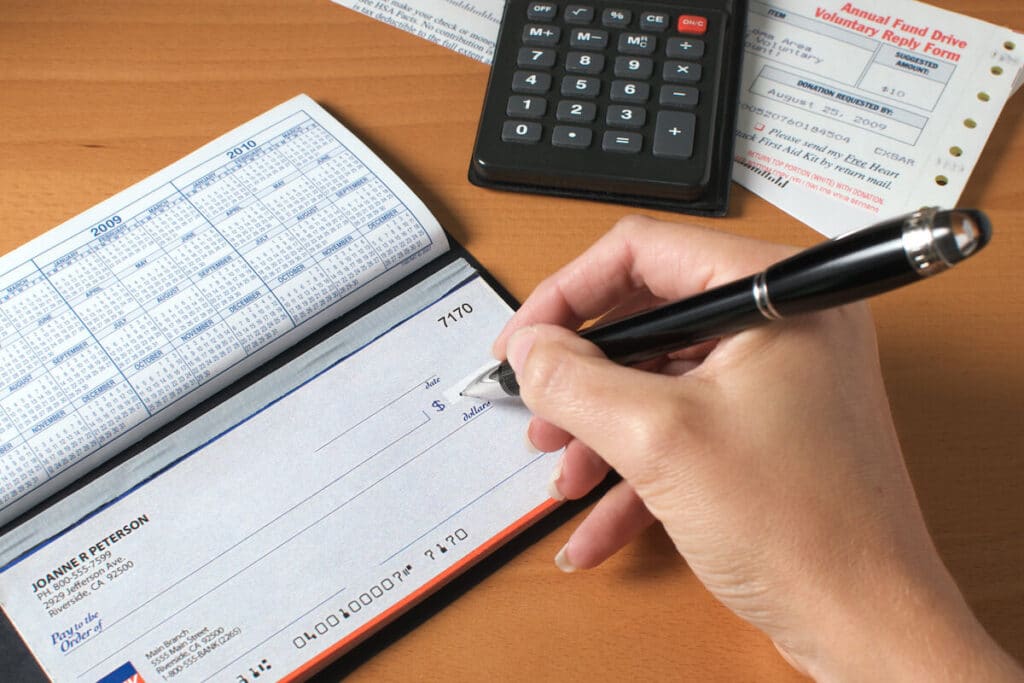Questions about checks come up often for Remitly customers, many of whom aren’t deeply familiar with the U.S. banking system. Do you have an old check on your hands? Wondering how long a check is good for?
Let’s dig in.
Do checks expire?
First, the short answer. Yes, checks do expire. When you receive payment via a paper check, you have a limited amount of time to cash or the deposit check.
Once the check expires, the bank is no longer required to accept it.
How long is a check good for? That depends on the type of check you’re talking about: personal, cashier’s check, certified check, or government-issued.
What are the expiry rules on different types of checks?
Take a look at your check and see which of the following categories it falls under.
Personal checks
The timeframe for personal checks is governed by the Uniform Commercial Code (UCC) in the U.S. After six months (180 days) from the issue date, personal checks are considered “stale dated.” That means you can still try to deposit the check, but the issuing bank may decline to honor it.
It’s at the bank’s discretion whether they want to handle a stale check more than six months old.
The biggest problem with depositing an old check from a personal checking account is the person who wrote the check may have forgotten about the payment and may not have the funds to cover the check.
Payroll checks and business checks
Like personal checks, business checks are good for six months from the date of issue.
Some checks may have the instruction “Void after 90 days.” Despite this warning, most financial institutions will continue to accept these checks up to the six-month limit.
It’s less likely an old check from a business will bounce, as businesses generally keep enough money in their accounts to cover unexpected amounts going out.
However, if the account number or routing number changes, the check may be invalid.
U.S. Treasury checks and federal government checks
A government check, like a tax refund, is good for one year after the date of issue. After 12 months, the check expires, and you will need to ask for a new one. You have six years to request a new check.
If you find an old IRS check that you have not cashed, you can make a claim for a new check.
There is also a process to ask for a new federal tax refund check if you lose the original document.
State and local government checks have their own expiration dates, so you will need to contact the government agencies that sent the check to find out if it is stale-dated.
Cashier’s check
The money for a cashier’s check has been transferred from a personal account to the bank’s account, where it remains until the check is cashed.
As a result, there is no expiration date on a cashier’s check. However, any unclaimed property will eventually be turned over to the state.
The amount of time depends on state law, but in California, you need to deposit a cashier’s check within three years of the issuing date. If your check does expire, you can ask the bank to reissue it.
Certified check
Like a cashier’s check, a bank representative has checked the funds are available in the check writer’s account before guaranteeing the check.
Unlike a cashier’s check, the money remains in the personal account of the check writer, but the money will stay there until the check is cashed.
As the money cannot be spent, a certified check does not expire. If the check is not deposited, the funds will eventually be turned over to the state.
Money orders
Money orders do not have an expiration date. However, some companies, like Western Union, charge a fee for cashing a money order older than one year.
Over time, these fees could add up and wipe out most of the value of the money order.
Charges will vary depending on the company issuing the money order, but the terms and conditions for this will be noted on the back of the document.
Traveler’s checks
A traveler’s check never expires. If you find an old traveler’s check, you can exchange it at most banks, a currency exchange center, or with the issuer.
For example, an American Express traveler’s check can be redeemed online and deposited into your bank account.
What could happen if I deposit an expired check?

If you are trying to deposit an old check into your checking account, first ask your bank whether they will accept the check.
If you can contact the person who wrote the check, it’s also a good idea to ask the issuer if you can go ahead and deposit the check or ask for a new one.
There is a risk that the check writer has forgotten about the payment, and no longer has the funds in their account to cover the amount. In this case, the check will bounce, and the check writer could be charged a fee by their bank.
Depositing a check from an account with insufficient funds can also cause issues for you. Some banks charge a returned item fee if the check doesn’t clear.
In another scenario, the check amount may be credited to your account before the check clears.
If there are not sufficient funds in the check writer’s account to cover the payment, your bank will take the money back out of your bank account—possibly leading to overdraft fees if you have already spent the money.
The bottom line is, attempting to cash a personal check that’s older than six months could result in hefty fees charged both to you and the person who gave you the check.
What should I do if someone does not cash checks I have written?
Go to the recipient first. If you write an uncashed check, get in touch with the payee and ask if they still have the outstanding check.
If it turns out they lost the check, ask your bank for a stop payment order to void the check. Note that many banks charge a fee for this service.
You can then issue a new check or pay in a different way.
If you can’t get in touch with the person you gave the check to, you should either stop the check with your bank, or make sure you keep enough money in that account to cover the amount should they ever decide to cash it.
Is there a better way to make a payment than with a check?
The use of checks as a form of payment has been declining for years, although they are still used by the federal government for tax refunds and stimulus payments.
It’s often more convenient to take advantage of electronic payment methods to send and receive money. Mobile wallets, online banking apps, and other money transfer services have changed the landscape of payments.
For example, sending money to countries around the world is fast and safe with Remitly’s app, which tracks your payment every step of the way.
